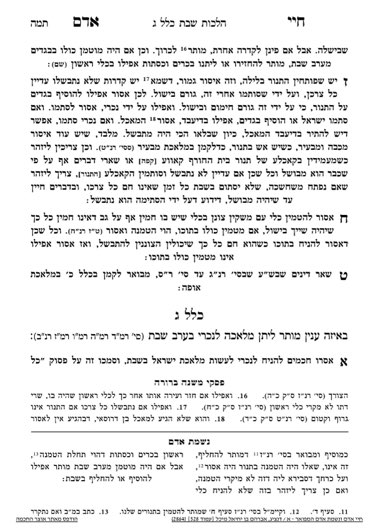We have finished siman 2, and are addressing a few other points regarding hatmana. Today, we will discuss whether it is permissible to open a contemporary oven door of a lit oven on Shabbos.
In general, ovens work on a heating cycle, in which the heating element turns off once the oven has reached its desired temperature. When the temperature decreases, it causes the element to go back on. When one opens the door of an oven, they release the heat trapped inside, which decreases the temperature in the oven and causes the thermostat to turn the heating element back on. When opening the oven door, the concern is that the temperature has already begun to decrease on its own in the oven, such that when the oven door is opened, the heating element immediately turns back on.
If the temperature has not yet begun to decrease, and even after opening the oven door there will still be a delay until the heating element turns on, opening the oven door is considered a grama (an indirect action or causation). Grama is not assur on a Torah level. The Gemara learns that the issurim of Shabbos are assur when they are actively transgressed, not when they are transgressed by causation. Nevertheless, Chazal prohibit grama unless there will be a loss. The poskim assume that both a case of safeik grama, and a vadai grama in which there is no intent to cause the grama, is muttar.
If so, if the current temperature in the oven is hot enough that the element will not turn on as an immediate effect of opening the oven door, it is muttar to open the oven door. However, if the temperature is hovering right around the area at which the heating element will turn on immediately when the door is opened, it is potentially a problem.
One way to approach this question is to consider it a davar she’eino miskavein, something for which a person has no intent. According to Rav Shimon, a davar she’eino miskavein is muttar. The Gemara gives the example of a person dragging an object over the ground, where it is possible that a person will cause a furrow in the ground, which is the melecha of choreish. Since one has no intent to create a furrow, it is muttar. However, if it is certain that the furrow will be dug (e.g, the object is heavy, the ground is soft, etc.), Rav Shimon agrees that it is assur. This is known as a psik reisha, something inevitable.
Regarding the oven, the argument can be made that although the oven has a heating cycle of sorts, it is never clear where the thermostat is in its cycle. It is not definitely going to turn on, but rather is a safeik. If so, we should consider this case a davar she’eino miskavein, and not a psik reisha, and it should be muttar to open the oven door at any point. This is the approach of Rav Moshe Feinstein, found in the back of Rav Eider’s sefer on hilchos Shabbos, and in his teshuvos in volume 8. However, many poskim disagree with Rav Moshe. We will discuss their approach in the next shiur, be’ezras Hashem.
Summary
Regarding opening an oven door on Shabbos, Rav Moshe holds that we can look at the heating element turning on as a davar she’eino miskavein, and therefore it will always be muttar to open the door. Other poskim disagree; we will discuss this question further in the next shiur, be’ezras Hashem.



